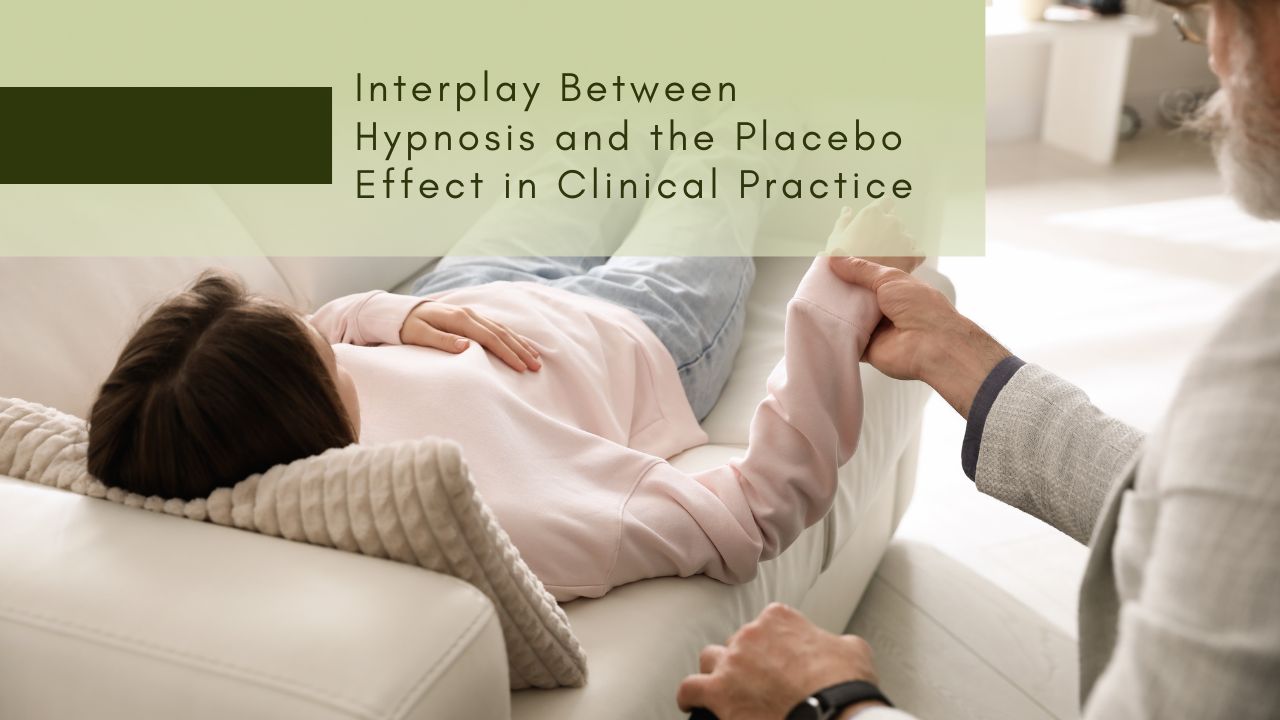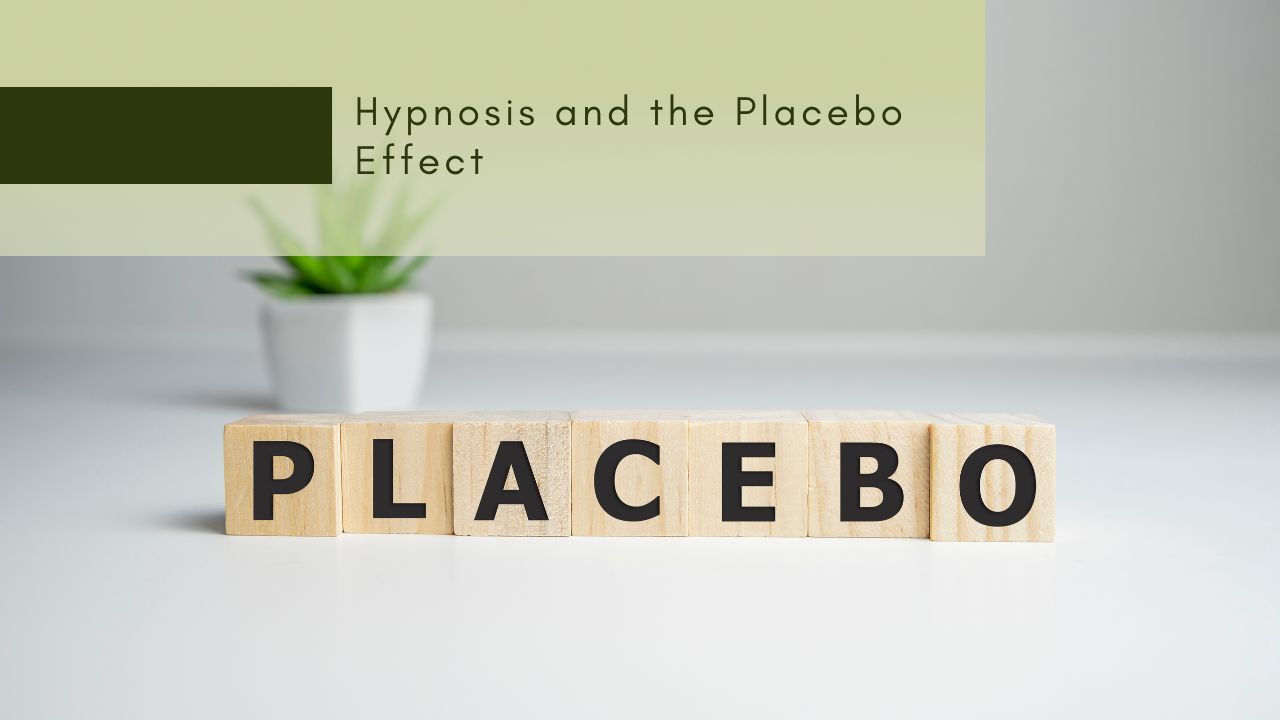What is the relationship between hypnosis and the placebo effect? Are they related phenomena or completely separate?
Hypnosis and the placebo effect share some similarities but are distinct phenomena. Both involve the power of suggestion and the mind’s ability to influence physical and psychological experiences.
Hypnosis is a state of focused attention, heightened suggestibility, and deep relaxation. In this state, individuals may be more open to suggestion and can experience changes in perception, sensation, and behavior. Hypnosis is often used therapeutically to help individuals overcome various challenges, such as managing pain, reducing stress, or breaking habits.
The placebo effect, on the other hand, occurs when a person experiences a benefit from a treatment or intervention that has no therapeutic effect on its own. This effect is believed to be driven by the individual’s belief in the treatment’s efficacy or by the psychological and physiological changes that occur due to that belief. Placebos can range from sugar pills to sham procedures, and their effectiveness highlights the significant role that mindset and expectation play in health outcomes.
While hypnosis can harness the power of suggestion to induce therapeutic effects, the placebo effect operates more broadly across various contexts, including medical treatments, psychological interventions, and even everyday experiences. However, it’s essential to note that hypnosis and the placebo effect can interact in complex ways, as both involve the mind’s ability to influence perception and behavior. For example, hypnosis may enhance the placebo response by increasing suggestibility or amplifying the individual’s belief in the treatment’s effectiveness.
How might hypnosis contribute to or enhance the placebo effect in therapeutic or clinical settings?
Hypnosis can potentially enhance the placebo effect in therapeutic or clinical settings through several mechanisms:
Increased suggestibility
Hypnosis induces a state of heightened suggestibility, making individuals more receptive to positive suggestions and therapeutic interventions. This heightened suggestibility can amplify the placebo response, leading to greater improvements in symptoms or outcomes.
Enhanced belief and expectation
Hypnosis can strengthen a person’s belief in the effectiveness of a treatment or intervention. By promoting positive expectations and confidence in the therapeutic process, hypnosis can bolster the placebo effect and amplify its beneficial effects on health outcomes.
Altered perception and experience
Hypnosis can modify a person’s perception of symptoms, pain, or discomfort. By altering subjective experiences and promoting relaxation or comfort, hypnosis can augment the placebo effect, leading to improvements in overall well-being and symptom management.
Activation of neurobiological pathways
Hypnosis has been associated with changes in brain activity and neurobiological processes, including alterations in pain perception, emotion regulation, and cognitive functioning. These neurobiological changes may interact with the placebo response, leading to synergistic effects and enhanced therapeutic outcomes.
Contextual cues and rituals
Hypnosis often involves the use of specific language, rituals, and contextual cues that can shape the individual’s expectations and beliefs about the therapeutic process. By leveraging these cues and rituals, hypnosis can enhance the placebo effect and optimize the effectiveness of treatment interventions.
In summary, hypnosis can contribute to or enhance the placebo effect in therapeutic or clinical settings by promoting increased suggestibility, enhancing belief and expectation, altering perception and experience, activating neurobiological pathways, and leveraging contextual cues and rituals. By harnessing the power of suggestion and the mind-body connection, hypnosis can synergistically enhance the placebo response and facilitate positive therapeutic outcomes.
Can the placebo effect influence the perceived effectiveness or outcomes of hypnotherapy?
Yes, the placebo effect can influence the perceived effectiveness or outcomes of hypnotherapy, just as it can affect other forms of therapy or medical interventions.
When individuals undergoing hypnotherapy have positive expectations and beliefs about its effectiveness, they may experience improvements in their symptoms or outcomes, even if the therapeutic intervention itself does not have specific physiological or therapeutic effects. This can occur through various mechanisms:
Expectation and belief
If a person believes that hypnotherapy will help them overcome a particular challenge or improve their well-being, their positive expectations can contribute to better outcomes. These beliefs may be influenced by factors such as the therapist’s reputation, the therapeutic setting, and the individual’s prior experiences with hypnosis or similar treatments.
Perception and interpretation of experiences
The placebo effect can influence how individuals perceive and interpret their experiences during hypnotherapy sessions. They may attribute positive changes in their thoughts, feelings, or behaviors to the therapeutic intervention, even if these changes are primarily driven by psychological factors such as suggestion, relaxation, or increased self-awareness.
Contextual factors
The therapeutic context, including the therapist-client relationship, the treatment setting, and the therapeutic rituals and procedures, can shape the individual’s expectations and beliefs about the effectiveness of hypnotherapy. Positive interactions with the therapist, a supportive environment, and a sense of trust and rapport can enhance the placebo response and contribute to better outcomes.
Neurobiological mechanisms
The placebo effect is associated with changes in brain activity and neurobiological processes, including the release of endogenous opioids, neurotransmitters, and other neurochemicals involved in pain modulation, emotion regulation, and reward processing. These neurobiological changes may influence the individual’s subjective experiences and contribute to the perceived effectiveness of hypnotherapy.
The placebo effect can play a significant role in shaping the perceived effectiveness and outcomes of hypnotherapy, highlighting the importance of considering both psychological and physiological factors in therapeutic interventions. By understanding and harnessing the power of suggestion, expectation, and belief, hypnotherapists can optimise the therapeutic process and facilitate positive outcomes for their clients.
Are there particular therapeutic applications where the placebo effect and hypnosis may have a synergistic or complementary role?
Yes, there are several therapeutic applications where the placebo effect and hypnosis may have a synergistic or complementary role, enhancing the effectiveness of interventions and promoting positive outcomes. Some of these therapeutic applications include:
Pain management
Both the placebo effect and hypnosis have been shown to be effective in reducing pain perception and improving pain-related outcomes. By combining placebo interventions with hypnotic techniques, such as suggestion, imagery, and relaxation, therapists can amplify the analgesic effects and provide holistic pain relief for conditions such as chronic pain, acute pain, and procedural pain.
Stress reduction and relaxation
Hypnosis and placebo interventions can promote relaxation, stress reduction, and emotional well-being. By integrating hypnotic suggestions with placebo-based relaxation techniques, therapists can enhance the relaxation response, reduce stress-related symptoms, and improve overall quality of life for individuals experiencing anxiety, tension, or stress-related disorders.
Symptom management
The placebo effect and hypnosis can be used to alleviate a wide range of symptoms and complaints, including nausea, fatigue, insomnia, and gastrointestinal distress. By combining placebo responses with hypnotic suggestions tailored to specific symptoms or conditions, therapists can address symptomatology comprehensively and facilitate symptom relief for individuals with various medical or psychological concerns.
Behavioral change and habit modification
Hypnosis and the placebo effect can facilitate behavioral change and habit modification by promoting motivation, self-efficacy, and positive reinforcement. By integrating hypnotic suggestions with placebo-based interventions targeting unhealthy behaviors or maladaptive habits, therapists can enhance the individual’s ability to make positive lifestyle changes, break harmful patterns, and cultivate healthier habits over time.
Psychological interventions
Hypnosis and the placebo effect can complement psychological interventions such as cognitive-behavioral therapy (CBT), mindfulness-based therapy, and exposure therapy. By incorporating hypnotic suggestions into placebo-controlled treatment protocols, therapists can enhance the effectiveness of psychological interventions, accelerate therapeutic progress, and address underlying cognitive, emotional, and behavioral patterns.
In summary, the placebo effect and hypnosis can synergistically enhance therapeutic outcomes across a wide range of applications, offering complementary approaches to symptom management, stress reduction, behavioral change, and psychological well-being. By integrating these approaches strategically within clinical practice, therapists can optimize treatment effectiveness, tailor interventions to individual needs, and promote holistic healing and wellness for their clients.
What are the potential implications or broader impact of better understanding the connections between hypnosis and the placebo effect?
Better understanding the connections between hypnosis and the placebo effect can have several potential implications and broader impacts across various domains:
Enhanced therapeutic interventions
By elucidating the mechanisms underlying hypnosis and the placebo effect, researchers and clinicians can develop more effective therapeutic interventions that harness the power of suggestion, expectation, and belief to promote healing and well-being. Integrating hypnosis with placebo-based treatments or conventional therapies can enhance treatment outcomes, optimise symptom management, and improve patient satisfaction.
Personalised medicine and treatment optimization
A deeper understanding of individual differences in susceptibility to placebo responses and responsiveness to hypnosis can inform personalized approaches to healthcare and treatment optimization. By identifying predictors of placebo responsiveness and hypnotic susceptibility, clinicians can tailor interventions to individual needs, preferences, and characteristics, maximising therapeutic benefits and minimizing adverse effects.
Mind-body interactions and holistic health
Exploring the connections between hypnosis and the placebo effect sheds light on the intricate interplay between psychological, cognitive, and physiological processes in health and well-being. By recognising the mind-body connection and the role of psychosocial factors in health outcomes, healthcare providers can adopt more holistic approaches to patient care, addressing both physical and psychological dimensions of illness and promoting integrated models of healing.
Ethical considerations and informed consent
A better understanding of the placebo effect and hypnosis raises awareness of the ethical considerations and implications associated with their use in clinical practice and research. By promoting transparency, honesty, and informed consent, healthcare providers can uphold ethical standards, respect patient autonomy, and foster trust and collaboration in the therapeutic relationship.
Advancements in neuroscience and psychology
Investigating the neural mechanisms underlying hypnosis and the placebo effect contributes to advancements in neuroscience and psychology, expanding our knowledge of brain functioning, consciousness, and the mind-body connection. By elucidating the neurobiological basis of suggestion, expectation, and altered states of consciousness, researchers can unravel the mysteries of human cognition and behavior, paving the way for innovative interventions and treatments.
Getting a better understanding of the connections between hypnosis and the placebo effect has the potential to revolutionise healthcare delivery, optimise treatment outcomes, and deepen our understanding of the mind-body connection and the complex interplay of psychological, cognitive, and physiological processes in health and healing. By embracing interdisciplinary approaches and integrating insights from psychology, neuroscience, and clinical practice, we can unlock new pathways to wellness, resilience, and holistic health for individuals and communities worldwide.




